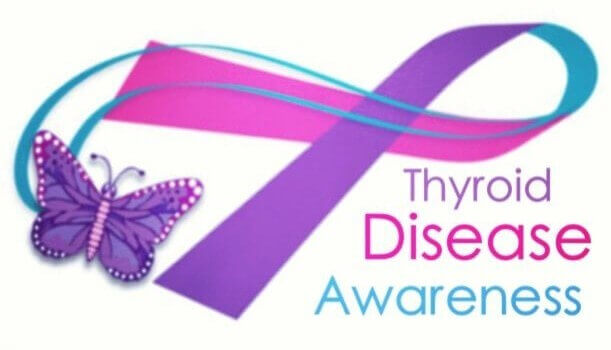
The month of January is designated as the Thyroid Awareness Month to familiarize people with the symptoms of thyroid disease. It is not something to be ignored, the thyroid disease affects approximately 200 million people worldwide, and if left undiagnosed and untreated, it can cause conditions such as depression, tremors, muscle weakness and constant fatigue. The small, butterfly-shaped gland – Thyroid, located at the base of the neck, plays a huge and a very important role in influencing the function of almost all the organs including the heart, brain, liver, kidneys and even the skin of your body.
The thyroid gland is mostly referred as the engine of the body. Just as an engine produces energy for the car to move, the thyroid gland produces thyroid hormone which regulates, among other things, your body’s temperature, metabolism and heartbeat. But as the engine needs fuel to run smoothly and efficiently, even the thyroid gland needs fuel known as iodine. Thyroid extracts the iodine that comes from the diet and makes two kinds of thyroid hormones: Thyroxine (T4) and Triiodothyronine (T3). Then, when your body needs thyroid hormone, it is secreted into your bloodstream in quantities set to meet the metabolic needs of your cells.
So, what goes wrong that causes thyroid problems? It’s when your thyroid is underperforming or over-active.
When the count of thyroid hormone increases, it causes a condition known as Hyperthyroidism or overactive thyroid and when the count goes down it causes Hypothyroidism or underactive thyroid. Symptoms of hyperthyroidism are rapid weight loss, high blood pressure, anxiety and insomnia and of hypothyroidism are – weak or slow heartbeat, muscular weakness, constant fatigue, weight gain, depression, slow reflexes, sensitivity to cold, thick, puffy or dry skin, slowed mental processes and poor memory, and constipation. The presence of thyroid disorder can be detected by the structural change of the thyroid gland. Thyroid disorder causes lumps or enlargement of the gland, making it painful and difficult to swallow.
If you find any of the symptoms of thyroid troubling you, get your gland checked as an early detection can save your butterfly-shaped gland from the formation of further severe conditions. Don’t try treating the problem on your own, as thyroid needs proper care and treatment. Consult the best experts at Shalby Hospitals and get your thyroid treated now. Don’t ignore symptoms of Thyroid. It can badly affect your health!!
Shalby Hospital in Ahmedabad has been providing top-notch medical services for more than three decades. We have gained a reputation for our expertise in eye and ear healthcare, making us the preferred choice for people looking for exceptional medical care in these...
Are you experiencing discomfort or pain in your ears, nose, or throat? If so, finding a reliable and skilled ENT specialist is crucial. Thankfully, Shalby Hospital is a reputable healthcare provider with a proven track record in the ear, nose, and throat...
What is Tonsillitis? Tonsillitis doesn’t have age, it can occur to anyone but they are often diagnosed among children from 5 to 15 years old. Tonsils are 2 oval-shaped pads of tissues at the back of your throat which helps airways to...